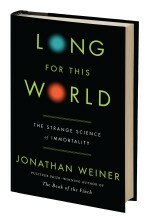Over at the Oregon Humanities web site, Dave Weich describes what it’s been like asking friends and strangers to imagine a future where people live for hundreds of years.
How would extending our lives indefinitely change us, Weiner wants to know, as individuals, as communities, as nations, and as a planet?
For weeks now, I’ve been interviewing friends, and friends of friends, and colleagues, and strangers at parties. Virtually everyone over thirty reflexively shrinks from the idea. “I get tired just thinking about it,” they’ll say. But soon a strange thing happens. They become animated. They ask someone nearby (or someone nearby approaches unsolicited, seeing arms waving or hearing a raised voice), and in this way the conversation continues.
Consider: Since 1900, the human life span has increased from 47 to 80 in developed countries. Better infant mortality rates are only one factor. Every day, our life expectancies increase by five hours, Weiner notes. (Existential punch cards: Live five days, get one free!)
Simply put, our lives continue to get longer and, together, we celebrate the news. These incremental gains we accept as our due. But living twice as long, or longer? We can’t wrap our heads around it. Somewhere between five years and five hundred, the ethics change.
Dave interviews authors for the web series ReadRollShow. His company created this web site as one of several spaces for conversation about long life.
Read Dave’s whole piece at OregonHumanities.org.
*That’s the mission of Oregon Humanities: to connect Oregonians to ideas that change lives and transform communities. The web site explains:
Oregon Humanities’ programs and publications provide a forum for individuals and communities to raise questions, challenge assumptions, listen to others, and think critically about the issues that directly affect their lives and those of the people around them. Our programs are designed to inspire insights, or what we call “O. Hm.” moments.
{ 0 comments }





